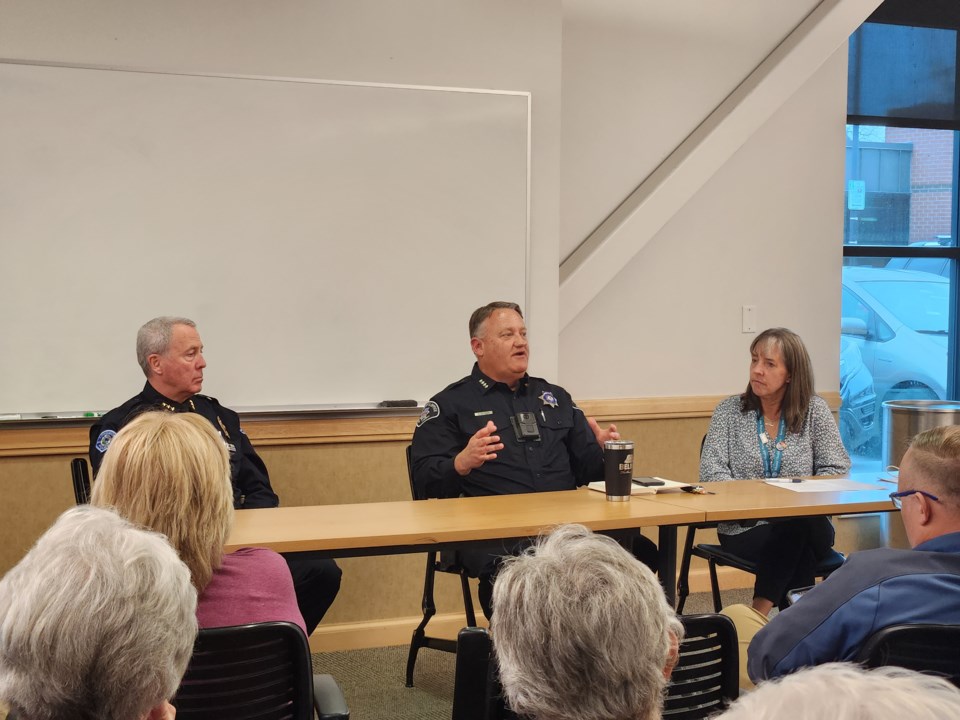Longmont’s police chief, the Boulder County sheriff and a leader of Mental Health Partners came together to discuss the intersection of guns, crime and mental health.
The event, hosted by the League of Women Voters of Boulder County, took on the tough topics and where they intersect Monday at Louisville Public Library. Longmont Police Chief Jeff Satur and Boulder County Sheriff Curtis Johnson agreed that they have been seeing more gun crimes in their jurisdictions, oftentimes with illegally obtained weapons.
Johnson highlighted the overlap between the criminal justice system and mental health issues left unaddressed.
“Can anyone tell me what the largest mental health facility in Boulder County is? The Boulder County Jail,” he said. “So I’ve got 430 people living under a roof that I’m responsible for and on any given day 60-70% are diagnosed with a mental illness.”
Jennifer Leosz, co-CEO of Mental Health Partners, emphasized that people with severe mental illness are more likely to be a victim of a violent crime rather than the perpetrator. While 46% of Americans believe those with severe mental illness are far more dangerous than the general population, only 4% of violence is attributable to serious mental illness, according to figures quoted by Leosz.
“Most people with mental health issues are never violent,” she said, noting that someone with a serious mental illness is 12 times more likely to be a victim of a violent crime.
Another area where guns overlap with mental health issues has to do with suicide, with more than half of all suicide deaths by firearm. Leosz said that this is often because gunshots are not reversible in the way other methods of suicide might be, with 85% of suicide attempts with a firearm being fatal.
Johnson explained that a lack of resources is a big contributor to the large number of mentally ill patients at the Boulder County Jail. On any given day, he said the jail has about 50 people waiting to go to the state’s mental health hospital and that it can take over seven months for them to get in due to extreme staffing constraints.
Johnson said Boulder County also lacks a place to put people who may interact with the police into mental health care outside of a jail setting, even though a jail setting might not be necessary or the best place for them.
Boulder County Jail is one of three jails in the state that has an in-custody restoration program to address mental illness with 16 beds, but as it is a state program those are shared with other regional jails. Johnson added that there’s not adequate outpatient restoration for people leaving the jail either.
Satur spoke to his frustrations with a system that currently leaves people without treatment and often back on the streets to commit the same crimes over and over again. He noted that while most people dealing with mental illness are in treatment, he’s seen those that are committing crimes repeating the same patterns.
“Really what they need is treatment, and there’s not enough treatment to help,” Satur said.
Johnson highlighted a possible road to more mental health treatment in Boulder County through a tax extension that would have to be approved by voters. In 2018, voters approved a tax to build an alternative sentencing facility, which would include 252 beds for lower-level crimes, that should be breaking ground in June.
That tax expires at the end of 2024. Johnson said that while the county has the funding to meet the goals outlined to voters, they’re considering asking for an extension of the same tax to create a facility devoted to mental health.
“We are looking at that as a potential model for our community to provide a more well-rounded holistic approach that touches on the criminal justice system but also serves the broader behavioral health needs of our community,” Johnson said.
Leosz said Mental Health Partners wants to explore partnerships and creative solutions with the community to address mental health concerns and expressed support for the sheriff’s idea.
The conversation also touched on new state legislation, like a bill recently passed establishing a three-day waiting period for the purchase of a firearm. Johnson was hopeful this could help prevent more suicides.
Another recent bill will expand the list of who can petition for an extreme risk protection order, which Johnson also felt would be a good thing. Satur added that in an ideal world, the systems in play could treat people before they get to the point that an extreme risk protection order would be necessary.
“If we can intervene with proper mental health treatment care beforehand so they don’t get to that cliff, it would be better off for everybody. But it’s hard,” he said.



